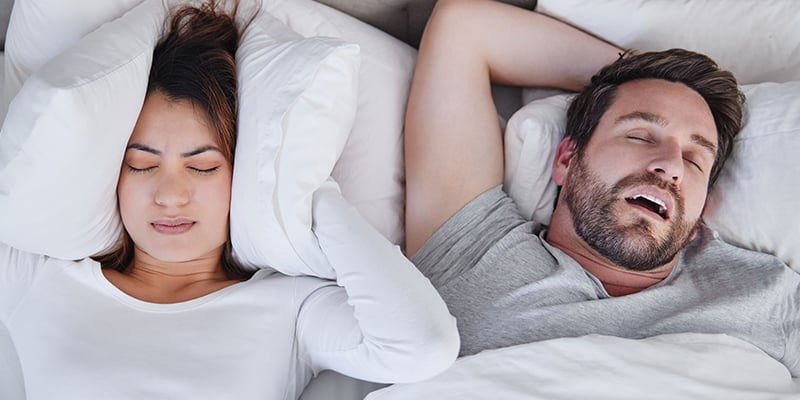
Have others said that you snore loudly at night while sleeping, often interrupted by snorts or gasps? Do you feel tired when you wake up, even after a full night’s sleep? Or do you experience significant drowsiness, moodiness, or irritability during the day? If so, you might be one of the estimated 30 million Americans who have sleep apnea. And this could be bad news for your memory.
Are you one of the estimated 30 million Americans who have sleep apnea? This could be bad news for your memory.
OVERVIEW OF SLEEP APNEA
According to the American Medical Association (AMA), 6 million people have been diagnosed with sleep apnea. That’s only about 1/5 of estimated cases, so many people remain undiagnosed. There are two types: central sleep apnea (often caused by other health conditions) and obstructive sleep apnea (OSA).
Here, we’ll focus on obstructive sleep apnea, the most common kind. It occurs when the upper breathing airway intermittently closes off during sleep. Breathing can stop for 10 to 20 seconds, and this interruption can occur 10 to 60 times every hour. The National Heart, Lung, and Blood Institute reports that many factors can increase risk by narrowing the airway, including obesity, large tonsils, or changes in hormone levels.
These brief air blockages may seem like a minor problem, but the cumulative effects add up. People with sleep apnea triple their risk for dementia and depression, while the chances of having a stroke are doubled. Heart disease risk also rises.
The AMA also notes that sleep apnea is associated with additional health concerns, such as hypertension, insulin resistance, and obesity. This problem may have also grown in recent years, as long COVID can further complicate a case of obstructive sleep apnea.
SLEEP APNEA SYMPTOMS
Sleep apnea affects more men than women—they’re twice as likely to have the condition. Snoring and frequent wake-ups throughout the night are two common effects of sleep apnea, but the problem is not limited to sleeping hours. Throughout the day, you can also experience tiredness, difficulty paying attention, and a compromised memory.
Of course, a lack of sound, uninterrupted sleep triggers additional issues, such as an increased risk of mental health conditions. Over time, not getting high-quality sleep can have a range of widespread effects on a person’s life: compromised performance at work or school, bodily injury through accidents, and relationship conflicts, to name a few.
That’s because sleep is a crucial component of overall health. The brain actually goes through a cleansing process overnight. Think of it like a waste management system for the brain—the process gets rid of toxins and plaques (some of which are associated with the onset of Alzheimer’s). Your brain is unable to do this during the day when it’s involved in so many other tasks, so sleep is a necessary time for its repair and renewal.
SLEEP APNEA AND MEMORY LOSS
Research continues to establish the connection between sleep problems, including sleep apnea, and a higher risk of memory problems and dementia. One meta-analysis of 42 studies examined the link between obstructive sleep apnea and episodic memory performance.
Tasks measured abilities like immediate recall, delayed recall, learning, and recognition memory. The results showed that “individuals with OSA are significantly impaired,” compared to healthy participants, on tests for verbal and visuospatial episodic memory.
Meanwhile, another study noted that people with obstructive sleep apnea experience both memory problems and higher rates of depression. The study, conducted at RMIT University in Melbourne, Australia, showed that people with sleep apnea had more over-general memories, compared to a control group.
They also had problems with semantic memory (recalling facts from their personal history). Researchers pointed out that not remembering many specific details of past life events is associated with depression. They theorized that sleep apnea “may impair the brain’s capacity to either encode or consolidate certain types of life memories.” Further studies are needed to explore these links.
Also carried out at RMIT University, a 2020 study showed that sleep apnea-related damage in the brain starts in the same place and spreads in the same way as in cases of Alzheimer’s disease.
The deceased study participants, who had obstructive sleep apnea, were examined through an autopsy of tissue from the hippocampus (the part of the brain associated with memory). They were found to have the same amyloid plaques in the brain that are markers of Alzheimer’s. These amyloid plaques are toxic to brain cells.
However, effectively treating sleep apnea can have a positive impact on memory and brain function. Through one study, published in Neurology, researchers determined that continuous positive airway pressure (CPAP) treatment may delay the progression of cognitive impairment.
The American Academy of Sleep Medicine noted that a different pair of studies, both conducted by the same researchers, found CPAP therapy could help repair the damage to both white and gray matter in the brain. In one of these studies, the treatment also led to better scores on cognitive tests, as well as improvements in mood, alertness, and quality of life.
SLEEP APNEA TREATMENT
The most common form of treatment for sleep apnea is CPAP therapy. A CPAP machine connects by tube to a mask that pushes air into the user’s airway so that it can’t close during sleep. Variations of this approach include:
- Bilevel Positive Airway Pressure (BiPAP or BPAP)
- Auto-Adjusting Positive Airway Pressure (APAP)
- Expiratory Positive Airway Pressure (EPAP)
According to the Sleep Foundation, additional treatment alternatives include oral devices to enable clear breathing airways, nerve stimulation, and a variety of surgical interventions.
Here’s the good news: Making healthier lifestyle choices can also be an effective treatment for sleep apnea. First, make sure you’re at a healthy weight. Adopt a diet that’s high in fiber and healthy fats. Exercise regularly.
In addition, avoid all caffeinated beverages, chocolate, nicotine, and alcohol in the late afternoon and evening. (In fact, you’d benefit from cutting out the alcohol altogether—it’s a known sleep destroyer, even if you don’t have sleep apnea.) And try sleeping on your side, elevating your head slightly with a pillow. Sleeping on your back could worsen snoring and other sleep apnea symptoms.
EARLY DETECTION FOR SLEEP APNEA
When we see the brain SPECT scans of patients with sleep apnea at Amen Clinics, the results do, in fact, resemble early Alzheimer’s disease. For example, in both cases, there is decreased blood flow to the parietal and temporal lobes.
Considering all of the ways in which sleep apnea can affect someone’s life—both in the short and long term—it’s crucial to get a diagnosis and treatment for sleep apnea. Because the brain is so oxygen-sensitive, these overnight episodes kill brain cells when the flow of oxygen stops.
The established link between sleep apnea and long-term memory loss is just another reason to get this problem diagnosed and treated as soon as possible. Start the road to better sleep with brain SPECT imaging, which can reveal areas of the brain with low blood flow. Proper treatment can help you obtain a better night’s rest—without sleeping pills or sedatives, which can be even more harmful to an already compromised brain.
Sleep apnea, memory problems, Alzheimer’s, and other mental health issues can’t wait. At Amen Clinics, we’re here for you. We offer in-clinic brain scanning and appointments, as well as mental telehealth, clinical evaluations, and therapy for adults, teens, children, and couples. Find out more by speaking to a specialist today at 888-288-9834 or visit our contact page here.





excellent advice!
Comment by Doug Morris — October 5, 2023 @ 11:39 AM
how much do brain scans cost and do you take medicare?
Comment by Helene Feldman — October 13, 2023 @ 6:12 AM
Would brain nutrients and circulation protocols help to prevent problems later on
Comment by Mohafiz Aziz — October 13, 2023 @ 7:00 AM
Thanks for this enlightening article.
Comment by Sue — October 13, 2023 @ 7:17 AM
Great advice !
Comment by Margarita Abrego — October 13, 2023 @ 1:40 PM
I live with a person undiagnosed until over 50. When tested, his oxygen level at night dipped to 70%. He fails to notice many things in daily life and fails to remember simple and obvious things, also failing to absorb learning that runs contrary to anything learned 20 years ago. He remained in an abusive situation as a "job" for years, which I blame on loss of executive function due to sleep apnea. 7 years after CPAP began, he is much better! Persons like him dismiss good advice because going for diagnosis requires energy and determination that they do not have.
Comment by M.H.B. Hughes — October 14, 2023 @ 6:11 AM
Great information. I wish Veterans Administration (VA) would authorize your brain scan. I'm a veteran and I reside in Hawaii.
Comment by Faye Mel — October 18, 2023 @ 12:35 AM